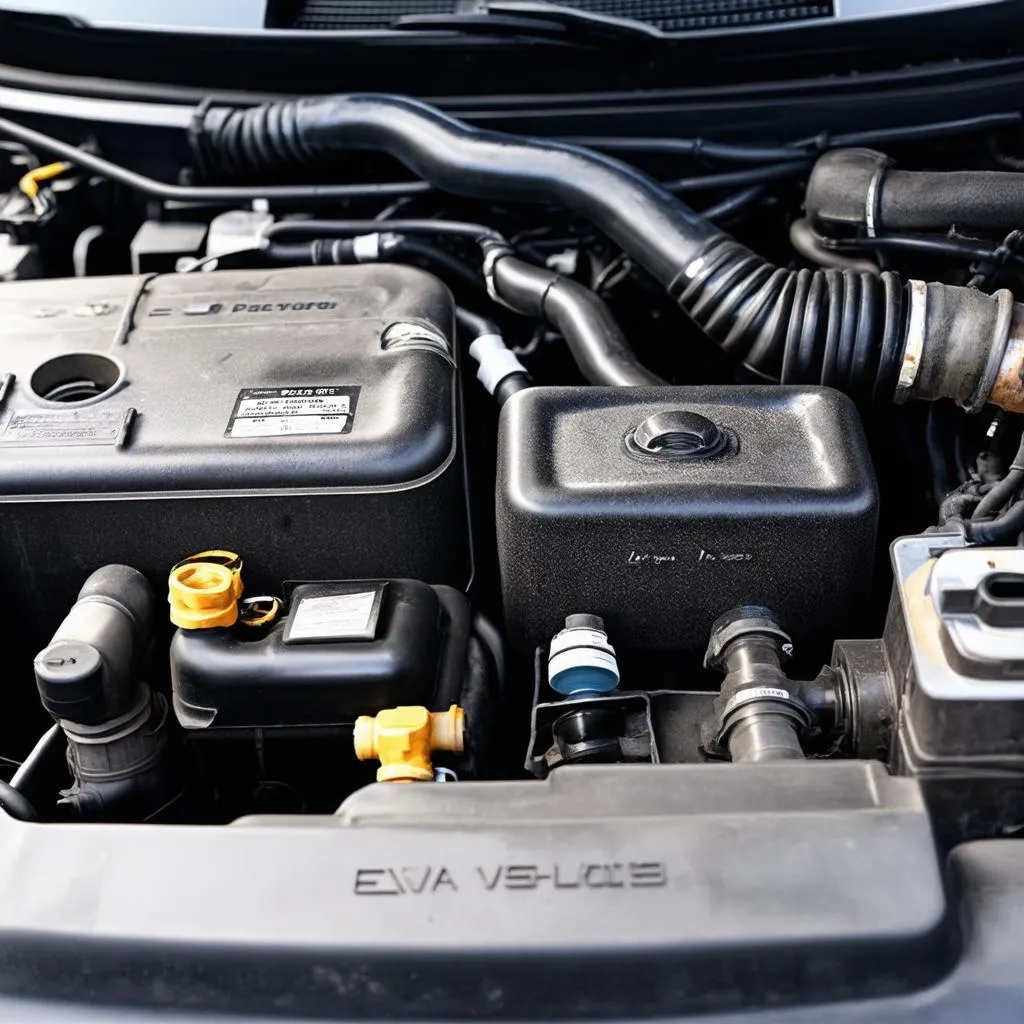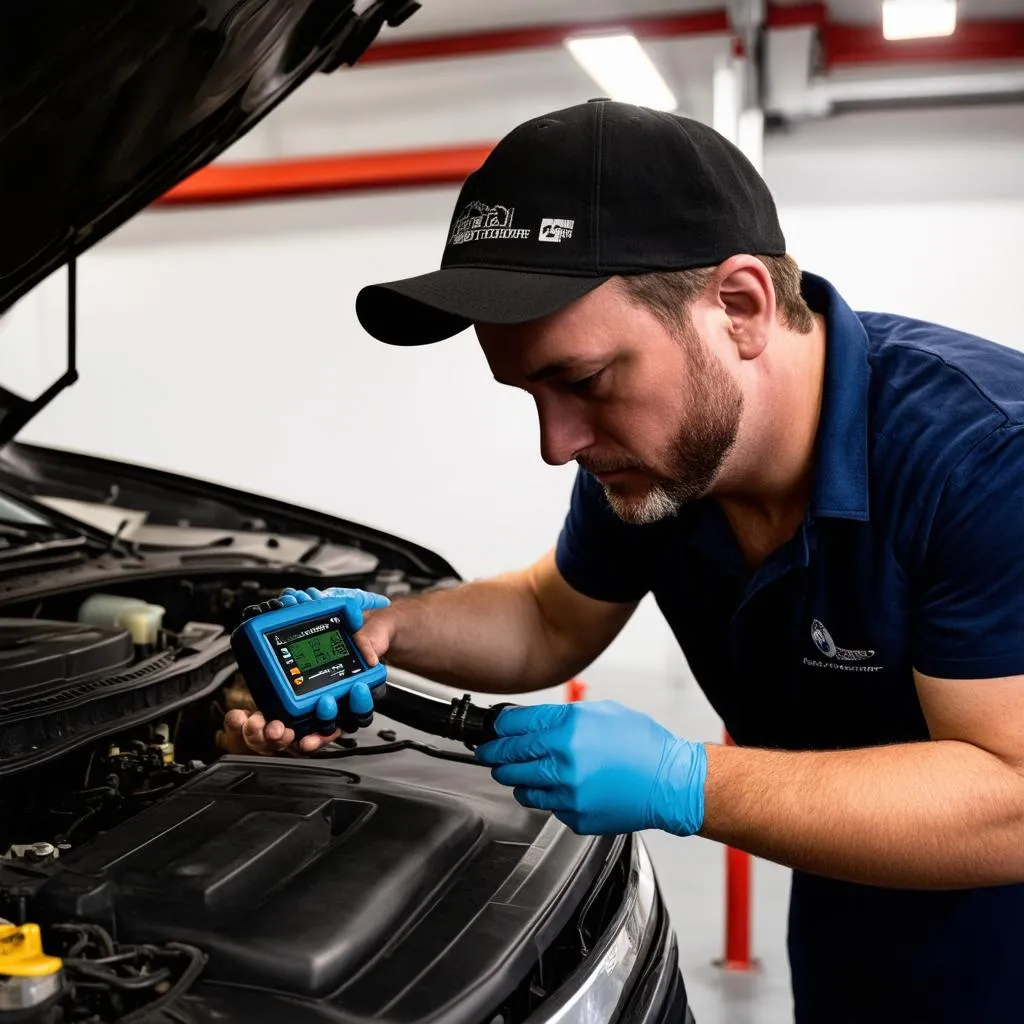Picture this: you’re cruising down the highway, windows down, radio blasting your favorite tunes, and suddenly, the dreaded check engine light illuminates your dashboard. Frustration sets in. You pull over, grab your trusty OBD-II scanner, and the cryptic code P0453 stares back at you. What does it all mean?
Don’t panic! If you’re driving a 2001 Ford F150 and encounter this code, you’ve come to the right place. This article will demystify OBD code P0453, explaining its meaning, causes, symptoms, and solutions.
Decoding the Jargon: Understanding OBD Code P0453
In simple terms, OBD code P0453 signifies an issue with your Ford F150’s Evaporative Emission Control (EVAP) system. This system plays a crucial role in preventing fuel vapors from escaping into the atmosphere. A “high input” usually indicates an electrical fault within the EVAP system, specifically a high voltage signal being sent to the Powertrain Control Module (PCM).
Think of the EVAP system as a sealed container that stores fuel vapors. When the pressure inside this container rises above a certain threshold, the PCM triggers the P0453 code, signaling a potential leak or electrical problem.
Why Should You Care About a “High Input” in Your EVAP System?
Beyond the annoyance of a glowing check engine light, ignoring a P0453 code can have real-world consequences:
- Environmental Impact: A malfunctioning EVAP system releases harmful fuel vapors into the environment, contributing to air pollution.
- Fuel Economy: A leak in the EVAP system can lead to reduced fuel efficiency, costing you more at the pump.
- Driving Performance: In some cases, a faulty EVAP system can cause rough idling, hesitant acceleration, or even engine stalling.
Common Culprits Behind the P0453 Code
Several factors can trigger the P0453 code in your 2001 Ford F150. Here are some common culprits:
- Faulty EVAP Vent Solenoid: This solenoid regulates the flow of vapors within the EVAP system. A malfunctioning solenoid can disrupt this flow, causing pressure to build up and trigger the P0453 code.
- Damaged EVAP Canister Purge Valve: This valve releases stored fuel vapors into the engine for combustion. A stuck-open or closed valve can cause pressure imbalances, leading to the code.
- Leaky EVAP Lines or Hoses: Cracks or loose connections in the lines or hoses connecting various components of the EVAP system can cause vapor leaks.
- Faulty Fuel Cap: A loose, damaged, or missing fuel cap can disrupt the pressure within the EVAP system, triggering the code.
- Electrical Issues: Wiring problems, such as corroded connectors or damaged wiring harnesses, can disrupt communication between the EVAP system components and the PCM.
Troubleshooting and Fixing the P0453 Code
While the prospect of diagnosing and repairing a car issue might seem daunting, remember that even seasoned mechanics rely on a systematic approach. Here’s a step-by-step guide:
- Visual Inspection: Start by visually inspecting the EVAP system components, including the fuel cap, hoses, lines, and connections. Look for any obvious signs of damage, cracks, loose connections, or wear and tear.
- Check the Fuel Cap: Ensure the fuel cap is tightly secured. A loose or damaged fuel cap is a common culprit behind EVAP system codes.
- Inspect the EVAP Vent Solenoid and Purge Valve: These components are often the primary suspects in P0453 cases. Test their operation using a multimeter or a vacuum pump to ensure they’re functioning correctly.
- Pressure Test the EVAP System: A professional mechanic can use a specialized smoke machine to pressurize the EVAP system and pinpoint any leaks.
 EVAP system components
EVAP system components
Seeking Expert Help: When to Call in the Pros
While some EVAP system repairs are DIY-friendly, others require specialized knowledge and equipment. If you’re uncomfortable working on your vehicle or suspect a more complex issue, it’s best to consult a qualified mechanic.
Remember: Addressing the root cause of the P0453 code is crucial. Ignoring it can lead to more severe and costly repairs down the line.
Frequently Asked Questions about OBD Code P0453
Q: Can I still drive my car with a P0453 code?
A: While you might be able to drive for a short distance, it’s not advisable to ignore the code. Driving with a faulty EVAP system can impact fuel economy, emissions, and potentially lead to further damage.
Q: How much does it cost to fix OBD code P0453?
A: The repair cost varies depending on the underlying cause. A simple fuel cap replacement might cost a few dollars, while replacing a faulty EVAP vent solenoid or purge valve can range from $100 to $300 or more in parts and labor.
Q: Can a bad gas cap cause a P0453 code?
A: Absolutely! A loose, damaged, or missing gas cap is one of the most common causes of EVAP system codes, including P0453.
Similar OBD-II Codes to P0453
Several other OBD-II codes relate to the EVAP system. Here are a few examples:
- P0440: Evaporative Emission Control System Malfunction
- P0441: Evaporative Emission Control System Incorrect Purge Flow
- P0442: Evaporative Emission Control System Leak Detected (Small Leak)
- P0446: Evaporative Emission Control System Vent Control Circuit Malfunction
 Mechanic checking car diagnostics
Mechanic checking car diagnostics
Keeping Your F150 in Tip-Top Shape
Regular maintenance is key to preventing EVAP system issues. Consider these tips:
- Regularly inspect your fuel cap: Ensure it’s tightly secured and replace it if it’s damaged or worn.
- Schedule routine inspections: Ask your mechanic to inspect your EVAP system components during regular maintenance checks.
- Address check engine lights promptly: Don’t ignore warning signs. Addressing issues early can prevent more extensive damage and costly repairs.
Need Help with Your 2001 Ford F150?
We understand that dealing with car troubles can be stressful. That’s why we’re here to help! If you need assistance diagnosing or resolving OBD code P0453 on your 2001 Ford F150, don’t hesitate to contact us via WhatsApp at +84767531508. Our team of automotive experts is available 24/7 to provide guidance and support.
Let us help you get your F150 back on the road and running smoothly!